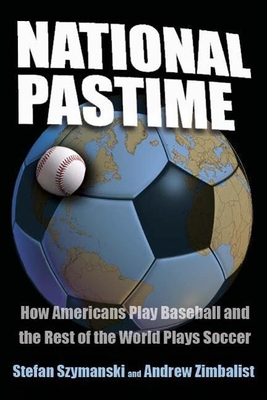

 Brookings Institution Press
Brookings Institution Press
National Pastime: How Americans Play Baseball and the Rest of the World Plays Soccer


Key Metrics
- Stefan Szymanski
- Brookings Institution Press
- Paperback
- 9780815782599
- 8.96 X 5.98 X 0.72 inches
- 0.89 pounds
- Sports & Recreation > Cultural & Social Aspects
- English
 Secure Transaction
Secure TransactionBook Description
This is the story of two great sports. One is America's game, while the other is the world's game. Baseball and soccer are both beloved cultural institutions. What draws fans to one game is often a mystery to fans of the other. Despite superficial differences, however, the business and culture of these sports share more in common than meets the eye. This is the first in-depth, cross-cultural comparison of these two great pastimes and the megabusinesses that they have become.
In National Pastime, Stefan Szymanski and Andrew Zimbalist illustrate how the different traditions of each sport have generated different possibilities for their commercial organization and exploitation. They pay special attention to the rich and complex evolution of baseball from its beginnings in America, and they trace modern soccer from its foundation in England through its subsequent expansion across the world. They illustrate how Victorian administrators laid the foundation for Major League Baseball (MLB) and soccer leagues such as the English Premier League, Italy's Serie A, and the European Champions League. The authors show how the organizers of baseball and soccer have learned from each other in the past and how they can continue to do so.
Both sports are rich in tradition. In some cases, however, these traditions--often arbitrary rules established by long-defunct administrators--have obstructed the healthy development of the sport. By studying the experiences of other sports, it might be possible to develop new and better ways to operate. For example, soccer might benefit from greater cooperation among teams as in baseball. On the other hand, MLB could learn from soccer's relegation rules and more open system of ownership, thus avoiding some of the excesses (competitive imbalance, uneven team resources) associated with monopoly.
National Pastime does not advocate the jettisoning of all tradition to adopt wholesale the approach of another sport, of course. In an era of globalization, where business interests are increasingly looking to transplant organizational ideas in order to maximize profits, the authors argue that fan-friendly reforms may be necessary in order to avoid something worse. Ultimately, they propose no simple solutions, instead suggesting specific reforms to the organization of baseball and soccer, drawing on each other's experiences. Lively and accessibly written, this book is essential reading for business analysts, journalists, policymakers, and managers of both sports. Most of all, however, it will appeal to baseball and soccer aficionados, whether they root for the New York Yankees, Manchester United, or Real Madrid.
Author Bio
Dr. Stefan Szymanski came to the University of Michigan School of Kinesiology as the Stephen J. Galetti Professor of Sport Management in 2011. Before that he had appointments at London Business School, Imperial College Business School, and Cass Business School, all in London. Dr. Szymanski completed an undergraduate degree at the University of Oxford, and received his PhD in Economics at Birkbeck College, University of London. As a leading expert in the economics of sports in general and soccer in particular, he is widely quoted in the media and has written op-eds for the New York Times, Washington Post, and Financial Times. You can follow him on Twitter (@sszy) and on his blog (soccernomics-agency.com).
Dr. Szymanski has authored more than one hundred academic papers published in reviewed journals, mostly on the economics and history of sport. He is the author of several books, including the New York Times bestseller Soccernomics (with Simon Kuper), the fourth edition of which appeared in 2018. The book has been translated into fifteen languages. A history of sports in Detroit (co-authored with Silke Weineck) will be published in 2020.
Dr. Szymanski has appeared as an expert witness on the economics of sport in numerous court cases on issues such as the collective sale of broadcast rights, the valuation of soccer clubs, and recently for the US Department of Justice on the economics of corruption in relation to the trial of former FIFA executives.
He is currently leading the development of a series of MOOCs (massive open online courses) on programming sports analytics in Python in collaboration with the U-M School of Information.
Source: University of Michigan
Videos






Community reviews
Write a ReviewNo Community reviews